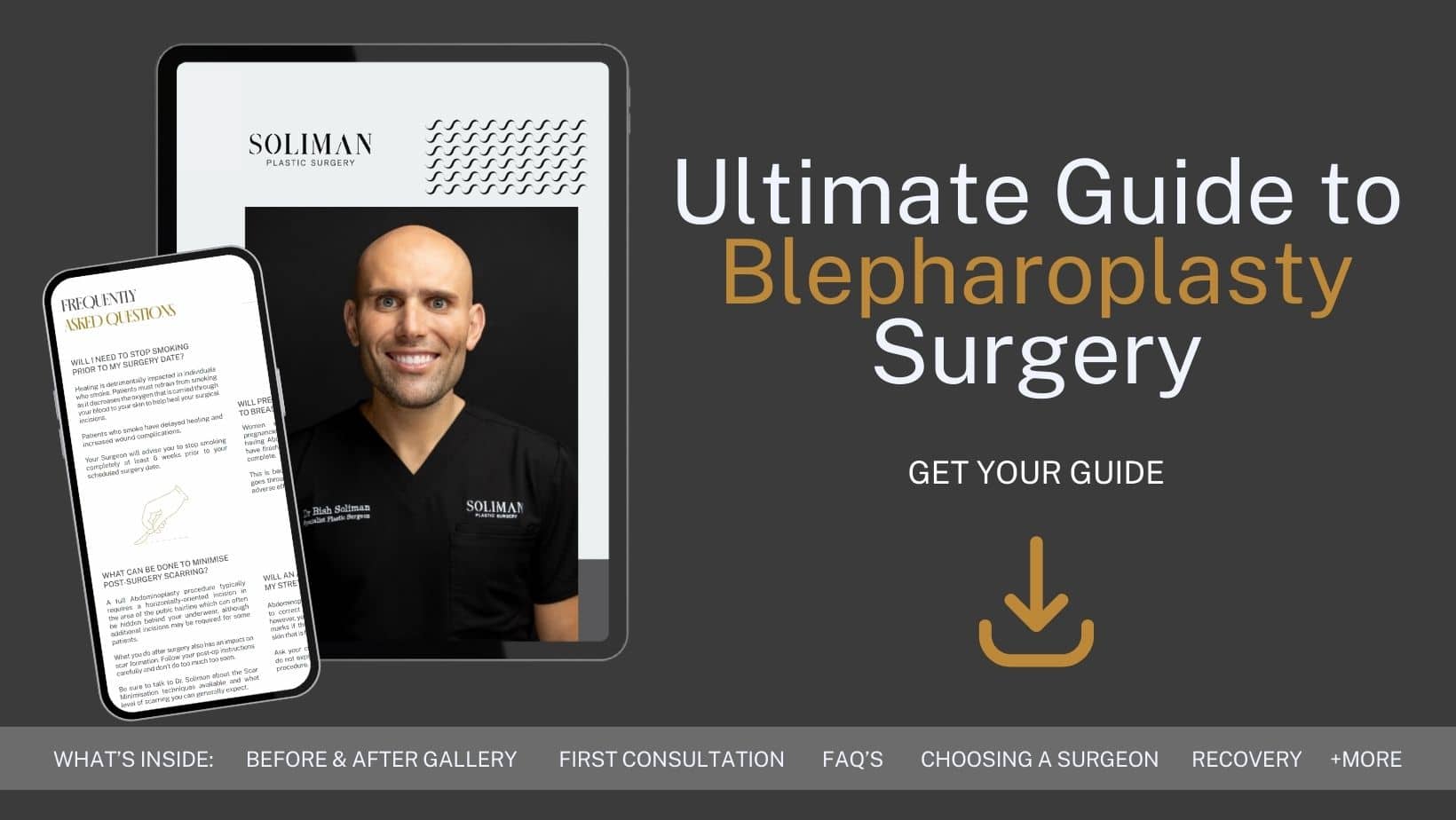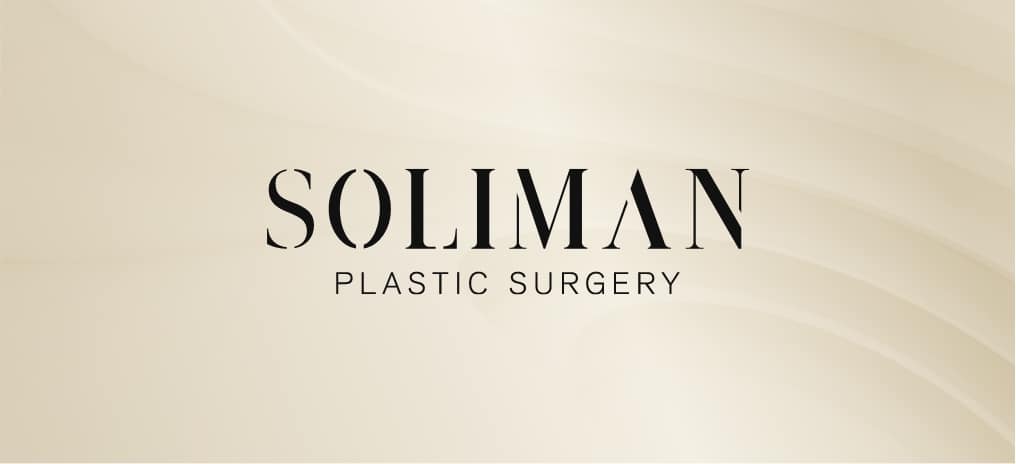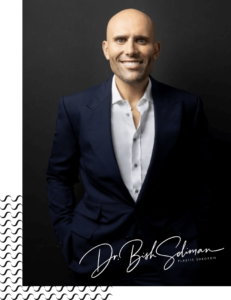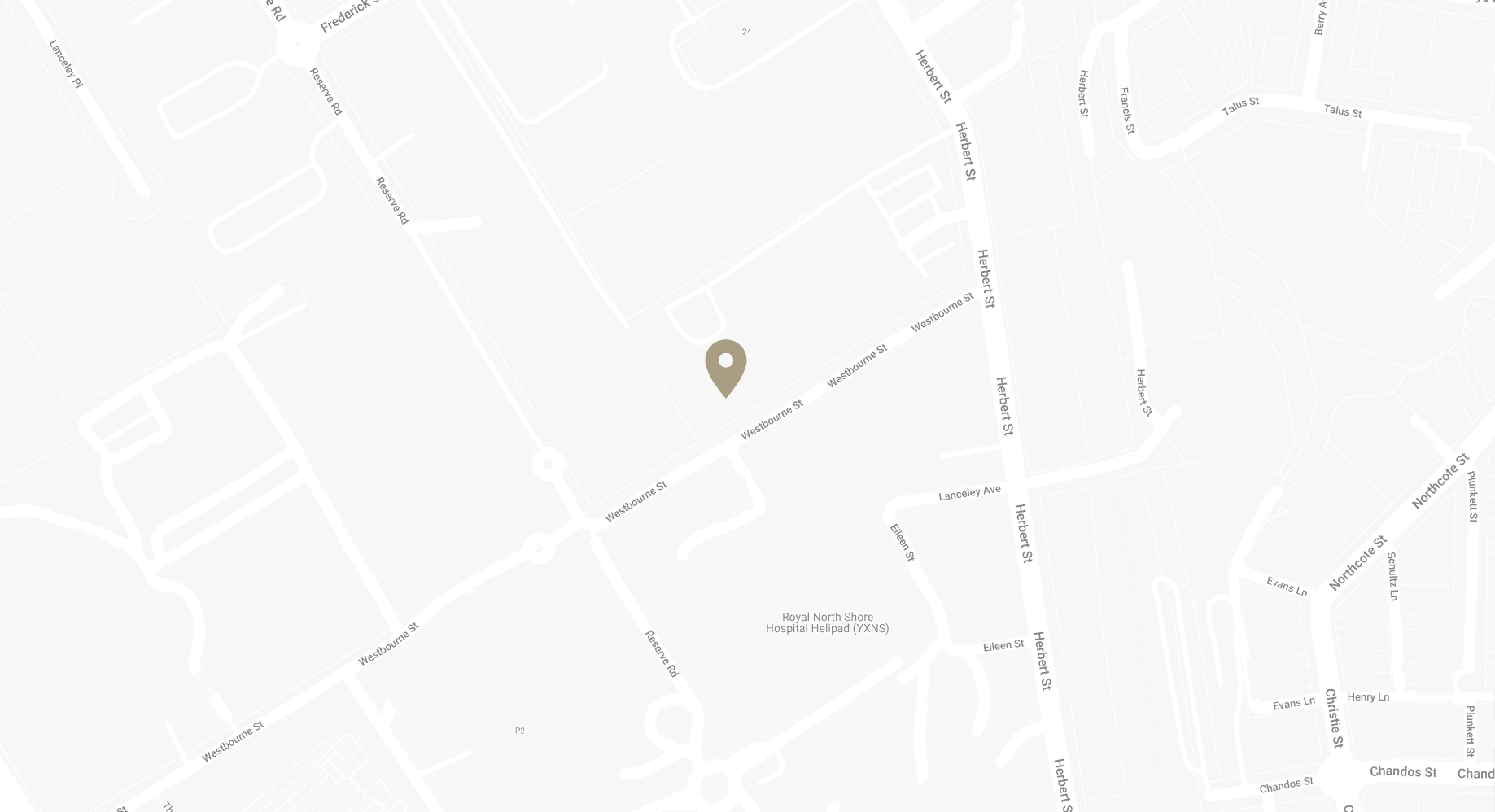Post-op Tips and Timeline for Recovery from Blepharoplasty
The success of your blepharoplasty doesn’t solely rely on the surgery itself; a smooth recovery plays an important role in achieving the desired results. In this blog, Specialist Plastic Surgeon Dr Bish Soliman will guide you through the steps of postoperative care and provide you with tips and a general timeline for a comfortable recovery.
Download Dr Bish Soliman Blepharoplasty Guide

Postoperative Tips for Eyelid Surgery Recovery
Tips for Managing Discomfort
- Take Prescribed Pain Medication: Dr Bish will prescribe pain medication to help manage any discomfort. Take the medication as directed, adhering to the recommended dosage and timing
- Apply Cold Compresses: Cold compresses can effectively reduce swelling and provide relief from discomfort. Use a clean cloth or cold gel pack wrapped in a thin cloth and apply it gently to the treated area for short periods (around 15 minutes) several times a day
- Elevate Your Head: Keeping your head elevated while resting can help minimise swelling. Use an extra pillow or sleep in a reclined position to promote better drainage of fluids and reduce the accumulation of excess fluids in the surgical area
Tips for Managing Swelling
- Continue Cold Compresses: Cold compresses not only help with discomfort but also play a crucial role in reducing swelling. The cold temperature constricts blood vessels, which can help limit the extent of swelling
- Limit Salt Intake: Consuming excessive salt can contribute to fluid retention and increased swelling. Opt for a balanced diet with reduced sodium content to help keep swelling in check.
- Stay Hydrated: While limiting salt is important, staying well-hydrated is equally essential. Drinking enough water supports your body’s natural healing processes and helps prevent dehydration, which can exacerbate swelling
- Avoid Heat Exposure: Exposure to heat, such as hot showers or saunas, can lead to increased blood flow and potential exacerbation of swelling. Stick to lukewarm water and avoid sources of heat during the initial recovery phase
Tips for Keeping the Surgical Area Clean
- Follow Dr Bish Soliman’s Instructions: Dr Bish will provide specific guidelines for cleaning the surgical area. Their recommendations are tailored to your unique case and are based on his expertise. Always adhere to these instructions to ensure proper care
- Use a Gentle Cleanser: Dr Soliman might recommend a specific gentle cleanser for cleaning the surgical area. Avoid using harsh or scented soaps, as these can irritate the delicate skin around the eyes
- Wash Your Hands: Before touching the surgical area, wash your hands thoroughly with soap and water. This reduces the risk of introducing bacteria to the incisions.
- Be Gentle: When cleaning the surgical area, be extremely gentle to avoid disrupting the healing process or causing any discomfort. Pat the area dry with a clean, soft towel instead of rubbing
- Avoid Makeup: Dr Bish Soliman will likely advise you to avoid using makeup around the surgical area during the initial recovery period. Makeup can introduce bacteria and hinder the healing process
- Keep Hair Away: If you have long hair, ensure that it is kept away from the surgical area. Hair can carry dirt and bacteria, which could potentially come into contact with the incision sites
- Avoid Submerging the Area: Refrain from submerging your face in water, such as swimming or taking long baths, until Dr Bish Soliman gives you the go-ahead. This helps prevent infection and allows the incisions to heal properly
Tips for Protecting Your Eyes
- Wear Dark Sunglasses: UV rays from sunlight can be harmful, especially during the initial stages of recovery when your eyes might be more sensitive. Wear dark sunglasses with adequate UV protection whenever you’re outdoors. Choose larger frames that provide coverage to the surgical area
- Avoid Rubbing Your Eyes: Itchy or irritated eyes are common during recovery, but avoid rubbing or touching them. Rubbing can disrupt the incision sites, increase swelling, and introduce bacteria to the area. If your eyes feel irritated, consult Dr Bish Soliman for guidance on appropriate remedies
- Protect from Wind: Wind can cause discomfort and dryness to your eyes. Wear sunglasses, a hat, or use a clean scarf to shield your eyes from wind when you’re outside
- Avoid Makeup Near the Eyes: Refrain from applying makeup to the eyelid area during the early stages of recovery. Makeup products can introduce contaminants and potentially irritate the sensitive skin around your eyes
- Limit Screen Time: Extended periods of staring at screens, whether they are phones, computers, or TVs, can lead to eye strain and discomfort. Minimise screen time, and if necessary, follow the 20-20-20 rule: every 20 minutes, look at something 20 feet away for at least 20 seconds
Tips for Sleeping Position
Your sleeping position can influence swelling and comfort:
- Prop your head up with extra pillows to keep your head elevated while sleeping. This can help reduce swelling
- If you have a recliner, consider using it for better sleep positioning during the initial recovery phase
Tips for Diet and Hydration
Proper nutrition and hydration are key contributors to healing:
- Consume a balanced diet rich in vitamins and minerals to support your body’s recovery process
- Drink plenty of water to stay hydrated, which can aid in the healing process
Avoid Strenuous Activities
Engaging in strenuous activities can strain your eyes and affect healing:
- Avoid activities that could increase blood flow to the surgical area, potentially leading to increased swelling or discomfort
- Consult Dr Bish Soliman before resuming exercise or physically demanding tasks
When to Seek Medical Attention
While discomfort and swelling are normal, it’s important to recognise when the intensity or duration of these sensations might indicate a potential issue. If you experience severe pain, sudden increase in swelling, excessive bleeding, or other concerning symptoms, contact Dr Bish Soliman promptly for guidance.
Timeline for Blepharoplasty Recovery
Immediately Post-Surgery (Days 1-2): The initial phase of recovery is all about rest and gentle care:
- You’ll likely experience some swelling, bruising, and mild discomfort immediately after surgery
- Have someone drive you home after the surgery, as your vision might be temporarily blurred
- Apply cold compresses as instructed to help reduce swelling
First Week (Days 3-7): During this period, you’ll gradually notice improvements in swelling and bruising:
- Swelling and bruising might peak around the third day post-surgery and gradually subside
- Continue using cold compresses as needed
- Attend follow-up appointments with your Dr Bish and his nurse to monitor your progress and for removal of any sutures at day 5.
Second Week (Days 8-14): As you enter the second week, you’ll likely see more positive changes:
- Swelling and bruising should further decrease
- You can begin to engage in light activities, but avoid strenuous exercises
Third Week (Days 15-21): The third week marks a pivotal point in your recovery journey:
- Swelling and bruising should continue to diminish, and you’ll notice a clearer complexion
- You might start feeling more comfortable
- You can gradually return to more regular daily routines, but still, avoid heavy lifting and intense workouts
Fourth Week and Beyond: As you approach the fourth week, your recovery progress will be more evident:
- Swelling and bruising should be significantly reduced, allowing you to appreciate the results of your surgery
- You might be cleared to wear makeup to enhance your look
- Remember that everyone’s healing process varies, so continue to be patient with your body’s natural pace
FAQs about Eyelid Surgery and Recovery
What is eyelid surgery (blepharoplasty)?
- Eyelid surgery, or blepharoplasty, is a surgical procedure designed to improve the appearance of the eyelids. It can address concerns such as excess skin, sagging muscles, and fatty deposits. By removing or repositioning these tissues, blepharoplasty can help create a more refreshed appearance.
Who is a good candidate for eyelid surgery?
Good candidates for eyelid surgery typically:
- Have excess skin or fat in the upper or lower eyelids
- Experience puffiness or bags under the eyes
- Are in good overall health and don’t have medical conditions that could impair healing
- Have realistic expectations about the outcomes of the surgery
Is eyelid surgery safe?
- Eyelid surgery is generally safe when performed by a skilled and experienced surgeon. Like any surgical procedure, there are risks and potential complications, including bleeding, infection, scarring, and changes in sensation.
How long do the results last?
- The results of eyelid surgery are long-lasting, but it’s important to remember that the natural ageing process will continue. While the effects of surgery won’t halt the ageing of your skin, they are long-lasting.
Further Reading about Face Surgery with Dr Bish Soliman
- Read Dr Soliman’s Blepharoplasty Sydney – Upper and Lower Surgery Page
- Read Dr Soliman’s Facelift Surgery Page
- Read Dr Soliman’s Neck Lift Surgery Page
- Read Dr Soliman’s Rhinoplasty Surgery Page
- Read Dr Soliman’s Earlobe Reduction Surgery Page
- Read Dr Bish’s Blog about Tips to Reduce Swelling and Bruising After Eyelid Surgery
Medical References about Recovery after Eyelid Surgery
- Complications of Blepharoplasty: Prevention and Management – NCBI
- Management of Cosmetic Eyelid Surgery Complications – NCBI
- Upper Eyelid Blepharoplasty: Evaluation, Treatment, and Complication Minimization – PubMed
- Eye Bag Surgery: Procedure, Alternatives, Cost, Recovery – Medical News Today
- Eye Lift: Blepharoplasty (Eyelid Surgery) Information – WebMD



